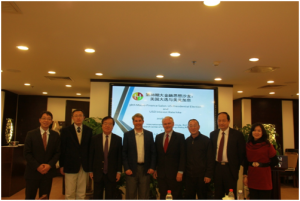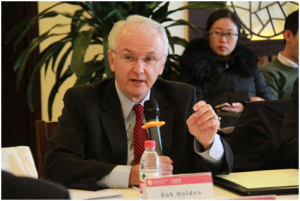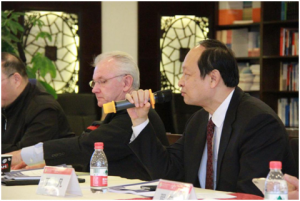Macro-Finance Salon (No. 38): US Presidential Election and USD Interest Rate Hike
2016-11-01 IMI On November 1, Macro-Finance Salon (No. 38), co-organized by IMI and Research Center of China’s Foreign Policy of RUC, was held successfully. The salon centered on US presidential election and USD interest rate hike. Foreign speakers include Bob Holden, former governor of Missouri, the chairman of Midwest US-China Association; David Oppedahl, an economist at the Federal Reserve Bank of Chicago. Chinese speakers include Wei Benhua, member of IMI Academic Committee and former deputy administrator-in-bureau of SAFE; Jin Canrong, director of Research Center of China’s Foreign Policy, and vice president of University of International Relations; Ding Yifan, former deputy director of the Institute of World Development of the Development Research Center of the State Council; Wang Wenfeng, researcher of the Institute of Contemporary International Relations and the Chief Editor of Contemporary International Relations. The salon was chaired by Di Dongsheng, researcher of IMI and deputy director of the Research Center of China’s Foreign Policy.
In his opening remarks, Mr. Wei Benhua claimed that the Sino-US relations is the most important bilateral relations in the world. He recalled that President Xi and President Obama, during their private meeting in California, have suggested that the two countries should embrace a new type of relations in which the two sides will strengthen their mutual trust, improve cooperation, seek common ground and joint hands in building a stable and prosperous Asia-Pacific region. Meanwhile, he looked forward to more cultural communication between China and the U.S.
On November 1, Macro-Finance Salon (No. 38), co-organized by IMI and Research Center of China’s Foreign Policy of RUC, was held successfully. The salon centered on US presidential election and USD interest rate hike. Foreign speakers include Bob Holden, former governor of Missouri, the chairman of Midwest US-China Association; David Oppedahl, an economist at the Federal Reserve Bank of Chicago. Chinese speakers include Wei Benhua, member of IMI Academic Committee and former deputy administrator-in-bureau of SAFE; Jin Canrong, director of Research Center of China’s Foreign Policy, and vice president of University of International Relations; Ding Yifan, former deputy director of the Institute of World Development of the Development Research Center of the State Council; Wang Wenfeng, researcher of the Institute of Contemporary International Relations and the Chief Editor of Contemporary International Relations. The salon was chaired by Di Dongsheng, researcher of IMI and deputy director of the Research Center of China’s Foreign Policy.
In his opening remarks, Mr. Wei Benhua claimed that the Sino-US relations is the most important bilateral relations in the world. He recalled that President Xi and President Obama, during their private meeting in California, have suggested that the two countries should embrace a new type of relations in which the two sides will strengthen their mutual trust, improve cooperation, seek common ground and joint hands in building a stable and prosperous Asia-Pacific region. Meanwhile, he looked forward to more cultural communication between China and the U.S.
 Mr. Bob Holden stated that Midwest US-China Association has made significant contributions to the friendship between China and the U.S, especially in education, culture, commerce and environment. He encouraged Chinese students to study and travel in the Midwest U.S. As for the election, Holden stressed that in recent years, colored population has risen tremendously and has become an important part of the U.S population. At the same time, traditional idea of white male dominance has been shaken by many factors, for example, the rising status of women, the LGBT rights movement, so much so that the candidates in this election have to put more emphasis on education, children’s care and public services during their campaign. He pointed out that no matter who would eventually win, rebuilding trust and understanding among American people should be put at the priority. For China and the U.S, cooperation and communication would always be the main course. Holden also share his views on the U.S economy. He suggested that the manufacturing in the U.S has no way to come back, therefore, developing technology and creating jobs in other sectors seemed inevitable. To solve the problem of unemployment, more investment should be made in education and infrastructure, and social security and medical care should follow up. Globalization is unstoppable, the government should do as much as it can to help the middle class to participate in the global economy. He also indicated that the U.S is pleased to see a prosperous China, for the rising of China is not a threat but an opportunity for the U.S.
Mr. Bob Holden stated that Midwest US-China Association has made significant contributions to the friendship between China and the U.S, especially in education, culture, commerce and environment. He encouraged Chinese students to study and travel in the Midwest U.S. As for the election, Holden stressed that in recent years, colored population has risen tremendously and has become an important part of the U.S population. At the same time, traditional idea of white male dominance has been shaken by many factors, for example, the rising status of women, the LGBT rights movement, so much so that the candidates in this election have to put more emphasis on education, children’s care and public services during their campaign. He pointed out that no matter who would eventually win, rebuilding trust and understanding among American people should be put at the priority. For China and the U.S, cooperation and communication would always be the main course. Holden also share his views on the U.S economy. He suggested that the manufacturing in the U.S has no way to come back, therefore, developing technology and creating jobs in other sectors seemed inevitable. To solve the problem of unemployment, more investment should be made in education and infrastructure, and social security and medical care should follow up. Globalization is unstoppable, the government should do as much as it can to help the middle class to participate in the global economy. He also indicated that the U.S is pleased to see a prosperous China, for the rising of China is not a threat but an opportunity for the U.S.
 Mr. David Oppedahl gave a speech on the U.S economy and the possibility of an interest rate hike. He pointed out that the two indicators determining the rate adjustment are unemployment rate and inflation rate. The rate hike could only happen when the unemployment rate keeps low and the inflation remains stable. The meeting of Federal Open Market Committee to be held next week will conduct an analysis on data and is likely to increase the interest rate if market conditions are promising. The FOMC meeting last September forecasted that current inflation rate is about 1% and will rise in the short term, very likely to reach the target of 2%. In terms of employment, 2.4 million jobs were created last year, but wages didn’t increase as the unemployment rate went down. The reason lies in the low productivity and the sluggish investment. Seen from the Q2 statistics, consumption remains robust but investment is below zero. Real estate took a downturn also; despite of a low mortgage rate, many borrowers didn’t reach the standards set by banks, therefore, failed to boost the housing demand. Plus, a strong dollar also caused impact to the U.S export. Oppedahl stated that it is still too early to predict the outcome of the meeting, but according to most of the FOMC members, the rate should be kept under 3% to a long run. He believes that the U.S economy is faring well in general and is able to achieve the growth rate of 2%.
Mr. Wei Benhua made comments on Mr. Oppedahl’s speech. He argued that the U.S, as the largest economy in the world, would generate spillovers to the rest of the world with its economic activities and monetary policies. History showed that every time the U.S increased its interest rate, the emerging markets would suffer from financial turmoil and capital flight. Therefore, he suggested the Fed take the interests of the emerging markets into consideration when making monetary polices. Besides, the U.S economy will not achieve the goal of 2% growth until 2019, the time for an interest hike has yet to come.
Prof. Ding and Wang also made their comments on the meeting. Later, the audience and the speakers had an interaction around topics of the U.S election and economy.
Mr. David Oppedahl gave a speech on the U.S economy and the possibility of an interest rate hike. He pointed out that the two indicators determining the rate adjustment are unemployment rate and inflation rate. The rate hike could only happen when the unemployment rate keeps low and the inflation remains stable. The meeting of Federal Open Market Committee to be held next week will conduct an analysis on data and is likely to increase the interest rate if market conditions are promising. The FOMC meeting last September forecasted that current inflation rate is about 1% and will rise in the short term, very likely to reach the target of 2%. In terms of employment, 2.4 million jobs were created last year, but wages didn’t increase as the unemployment rate went down. The reason lies in the low productivity and the sluggish investment. Seen from the Q2 statistics, consumption remains robust but investment is below zero. Real estate took a downturn also; despite of a low mortgage rate, many borrowers didn’t reach the standards set by banks, therefore, failed to boost the housing demand. Plus, a strong dollar also caused impact to the U.S export. Oppedahl stated that it is still too early to predict the outcome of the meeting, but according to most of the FOMC members, the rate should be kept under 3% to a long run. He believes that the U.S economy is faring well in general and is able to achieve the growth rate of 2%.
Mr. Wei Benhua made comments on Mr. Oppedahl’s speech. He argued that the U.S, as the largest economy in the world, would generate spillovers to the rest of the world with its economic activities and monetary policies. History showed that every time the U.S increased its interest rate, the emerging markets would suffer from financial turmoil and capital flight. Therefore, he suggested the Fed take the interests of the emerging markets into consideration when making monetary polices. Besides, the U.S economy will not achieve the goal of 2% growth until 2019, the time for an interest hike has yet to come.
Prof. Ding and Wang also made their comments on the meeting. Later, the audience and the speakers had an interaction around topics of the U.S election and economy.

